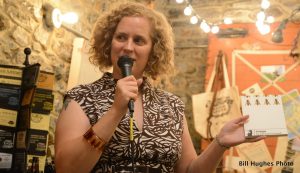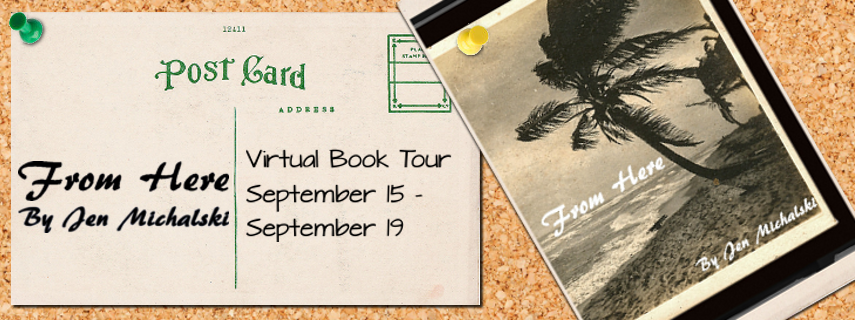Today is the third stop of Jen Michalski’s virtual book tour celebrating her new collection, From Here. The twelve stories in From Here explore the dislocations and intersections of people searching, running away, staying put. Their physical and emotional landscapes run the gamut, but in the end, they’re all searching for a place to call home.
Thematically, how does this collection differ from your other books?
I think there are some similar themes of isolation and dislocation that I explored in The Tide King and also Could You Be With Her Now, but the stories in From Here are through the prism of many different narrators, who differ in age, sex, ethnicity, physical locale. I’d written these stories over a period of seven years, maybe, but I think there’s a lot more of me in them than the aforementioned work, my inner struggle of wanting to belong, to find a place to feel at home. But, at the same time, I think, like any story collection, is a good cross section of my work. Some of it I wrote when I was single, some when I met my partner, and I was deep into my thirties and some of my life priorities were changing, and maybe my perspective, too.
You talked a bit in your Atticus author feature about writing to check and see if you are being a human correctly. What did you learn about yourself after writing and putting together these stories?
I think there are several stages to it. For years, I wrote myself into characters, into whom I could explore my own struggles with sexuality, with introversion, and with relationships, romantic and familial, vicariously, but also do it at a distance. There was the initial catharsis of purging feelings and seeing them on the page in the characters, but then there’s a dialogue, collaboration that begins with the reader after the story is published. People will come back to you and say, “I really like this story or that story,” and the way they’ve connected with it isn’t always the same as you did writing it, and you think about it more. And maybe you discover things in yourself, or you realize you really aren’t that different than other people. I think the biggest lesson I’ve learned from writing From Here is that none of us really belong, and because we’re all outside looking in, we all belong together.
Before writing down a single word, how are your stories conceived?
Many of the stories I write, I’ve mentioned before, come to me in dreams. But some of them don’t. One story in the collection, “Neighbors,” despite its surrealistic premise, came to me so innocuously. I was walking by the front door of the house and my neighbor’s two-year-old granddaughters were playing in my yard, which, unlike theirs, is fenced. Often they’d play in my yard for this reason, but on this particular day, they were naked. And I was naturally a little concerned about what my responsibilities were, having two indecently exposed children in my yard, whether I was breaking a law or could be registered as a sex offender or whatever. So I did what anyone would do: I closed the blinds and pretended I wasn’t home. Then I had an idea for a story with a pregnant man who also had twins previously.
“Sometimes stories begin as a response, a departure point from other stories I’ve read. Another story in the collection, “The Safest Place,” in which a poor, smart Ukrainian girl’s childhood friend, a once-bullied youth who’s graduated to small-time dealer, tempts her with the easy gain of drug money, germinated after I read Curtis Smith’s haunting “Think on Thy Sins,” in which a son takes over his father’s not all-on-the-level business. I didn’t know if I could write something like that, and I took it as a challenge to myself.
The title story in the collection, “Orion,” came to me one night after I couldn’t sleep and I wondered whether I could write a story in which I used the same word at the beginning of each sentence (“they”) and not have it turn out like crap.”
The title story in the collection, “Orion,” came to me one night after I couldn’t sleep and I wondered whether I could write a story in which I used the same word at the beginning of each sentence (“they”) and not have it turn out like crap.
In From Here the stories use different points of view: first and third, male and female. How do you decide who tells the story?
I don’t know. That information feels intrinsic in the voice. I rarely rewrite a story in a different point of view. Some stories need or feel more distant to me, or I need to be more distant, and they are in third. Sometimes the characters are so real they literally tell the story to me, and oftentimes they wind up in first person. I’m pretty comfortable writing in male or female perspectives; I only hope they sound authentic to the reader.
What role does love play in your collection?
There is a lot of bittersweetness in this collection, a lot of disappointment, in familial love and relationships, not understanding the complex rules of it, but really, aren’t most short stories about love sad? There’s a perception in popular culture, in advertising, that love is easy and natural and it’s everything that’s good in the world, but you can only judge its value against its loss–how one feels after it’s gone. Love is very expensive, and I find that my characters must decide whether they can afford the cost of it.
“Dog Days” stood out as humorous from beginning to end, while your other stories have humor pop up occasionally. What made you decide to include “Dog Days” in this collection?
I actually didn’t consider “Dog Days” funny! I mean, funny things happen in it while the three brothers try to stay out of their mother’s hair: they play baseball, they find a stray dog, but a sad thing happens at the end, and there is a scrappy sadness in the relationship among the brothers. They’re all different but normal in their own way, with only their mother to raise them, but you worry what will happen to them when they grow up, whether they’ll turn out okay. They’re at point in their lives–ages 11, 13, and 15–where they are very fragile, where they might be experiencing the last summer of their innocence individually and together, before they’ll have more important problems confronting them.
In “The Mural,” Carlotta paints her entire house as an emotional coping mechanism. Where did you hear about this therapeutic technique? Have you tried it yourself?
I haven’t. I don’t even know how the idea happened. Oftentimes, I’m writing a story, and even I don’t know what’s going to happen. I just have an image, a first sentence, and the story unfolds in real time for me, too, which is a nice surprise. I knew Carlotta would be painting a mural for the baby, I knew she would have a miscarriage, and I knew her pediatrician, Eve, would take an interest in her, but I didn’t know that was going to happen until Eve came over to check in on her. I thought they might kiss, and who knows, maybe they did after we left them in the story, but instead Eve urges Carlotta to complete the mural. And it’s so cathartic that Carlotta paints not only the future she thought she would have but also her past. She paints a new portrait, a new perspective, of her life. And I have Eve’s quick thinking to thank for that.
Why would From Here make a good book club pick?
I don’t want to say there’s something for everyone, but there is a lot of variety. There are more controversial topics broached, like abortion, there’s alcoholism and mental illness, there’s magical realism, there’s realism, there’s more stylistic selections, there are gay and straight, male and female protagonists, and they’re all just left of center, wanting to feel like they belong. It’s not that I consciously chose to include such a wide range; I just find that I am interested in a lot of different things and wind up writing about them.
What is the best compliment you’ve earned for From Here?
The reviews are still out, but someone who just finished the collection told me that I reminded them of Anne Tyler. I’ll take it!
*Tomorrow, stop by Book Puke to check out the drawings Jen creates when she’s writing. If you missed yesterday’s stop, go to The Next Best Book Club blog to check out an excerpt from the collection and Jen’s author insights.
 Jen Michalski is author of the novel The Tide King, winner of the 2012 Big Moose Prize; the short story collection Close Encounters; and the novella collection Could You Be With Her Now. She is the founding editor of the literary quarterly jmww, host of the Starts Here! reading series, and interviews writers at The Nervous Breakdown. She also is the editor of the anthology City Sages: Baltimore, which Baltimore Magazine called a “Best of Baltimore” in 2010. She lives in Baltimore, Maryland, and tweets at @MichalskiJen. Find her at jenmichalski.com.
Jen Michalski is author of the novel The Tide King, winner of the 2012 Big Moose Prize; the short story collection Close Encounters; and the novella collection Could You Be With Her Now. She is the founding editor of the literary quarterly jmww, host of the Starts Here! reading series, and interviews writers at The Nervous Breakdown. She also is the editor of the anthology City Sages: Baltimore, which Baltimore Magazine called a “Best of Baltimore” in 2010. She lives in Baltimore, Maryland, and tweets at @MichalskiJen. Find her at jenmichalski.com.
![[PANK]](http://pankmagazine.com/wp-content/themes/pank/assets/images/pank-logo-large.png)

